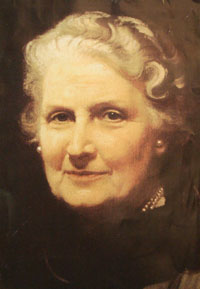Montessori at 100
I had printed out a Slate.com article about "The Cult of the Pink Tower: Montessori turns 100—what the hell is it? written by Emily Bazelon. I came upon it tonight and finally read it through.
 Maria Montessori was Italy's first woman doctor and came to America in the mid-1930's as a kind of revolutionary educator. The first Montessori school opened in Rome in 1907.
Maria Montessori was Italy's first woman doctor and came to America in the mid-1930's as a kind of revolutionary educator. The first Montessori school opened in Rome in 1907.Her revolution flowered and withered in the U.S. becoming more of a "cult" than mainstream educational movement.
Then in the swinging 1960's (Montessori had died in 1952), her ideas about children's "absorbent minds" and their ability to teach themselves found favor with the revolutions of the time.
There was some of it (and Summerhill and such) left when I was in college as an English major and education minor.
The elementary teachers had more of it - "toylike cubes, and child-size shelves and bins, seemed like the perfect romantic alternative to boring workbooks and rows of desks," says Bazelon.
There are 5,000 schools devoted to her methods in the U.S. (17K worldwide), though anyone can hang the Montessori concept on a school. Many are preschools, but some elementary and middle school grades.
The article claims that Montessori education remains a cult, and seems to imply that they (not Maria) might actualy like that status.
The Montessori philosophy, as I look at it from the outside, isn't so different from other educational approaches we studied. Like Piaget, she believed that children develop and think differently than adults - if that seems too obvious, you need to know that in her times there were amny who children as "adults in small bodies" and thought schooling should do the same. There's some of that in her work versus play idea.
Her method (as described in various places online)
- discourages traditional assessments (grades, tests) which damage kids
- rather than feedback and qualitative analysis of a child's performance, something like a narrative of the child's achievements, strengths and weaknesses
- has two primary development levels birth - 6 and 6-12.
- Level 1 = casa dei bambini ("children's house") with a focus on individually-paced learning and development.
- Level 2 devotes much time to collaboration and "cosmic education"
- individuality is a key though
- respect each student's talents & needs (as opposed to the needs of the class as a whole)
- encourage independence and freedom with limits and responsibility
- There are also (especially at level 1) domestic skills and manners (with the intended result of increasing attention spans, hand-eye coordination, and tenacity)
I've never been in an M school, so the Slate article's look into one (the author's son,4, attends one) was interesting to me. (His teacher did the training in the method which centers on the Association Montessori Internationale and is a full-time nine-month course for college graduates.)
She observes some sessions at the school and is surprised that when the teacher says "Gentlemen, it's time to get into our work," the kids get busy.
Montessori preferred the idea of "work" to children's play. She observes someone working on a "long sevens chain" (beads separated into groups of seven), and the teach-yourselfism that has one worker making number tabs so that 294 is followed by 301. It seems playlike to me that someone was stacking the pink tower of cubes - but perhaps she would move on to cubism or architecture next.
I'm getting cynical. But Science magazine did a study in 2006 on some measurable advantages for the Montessori method. In their study, by the end of kindergarten, the Montessori students outscored the other kids on standardized tests of reading and math. They also treated each other better on the playground, and "showed more concern for fairness and justice" and "wrote more creative essays with more complex sentence structures," and said they felt a sense of community at school.
That's pretty impressive.
I'm working this summer on professional development for a 7-12 science & math magnet school and most of this would sound reasonable in the plans.
Is anyone teaching at a Montessori-styled high school?
Comments
No comments